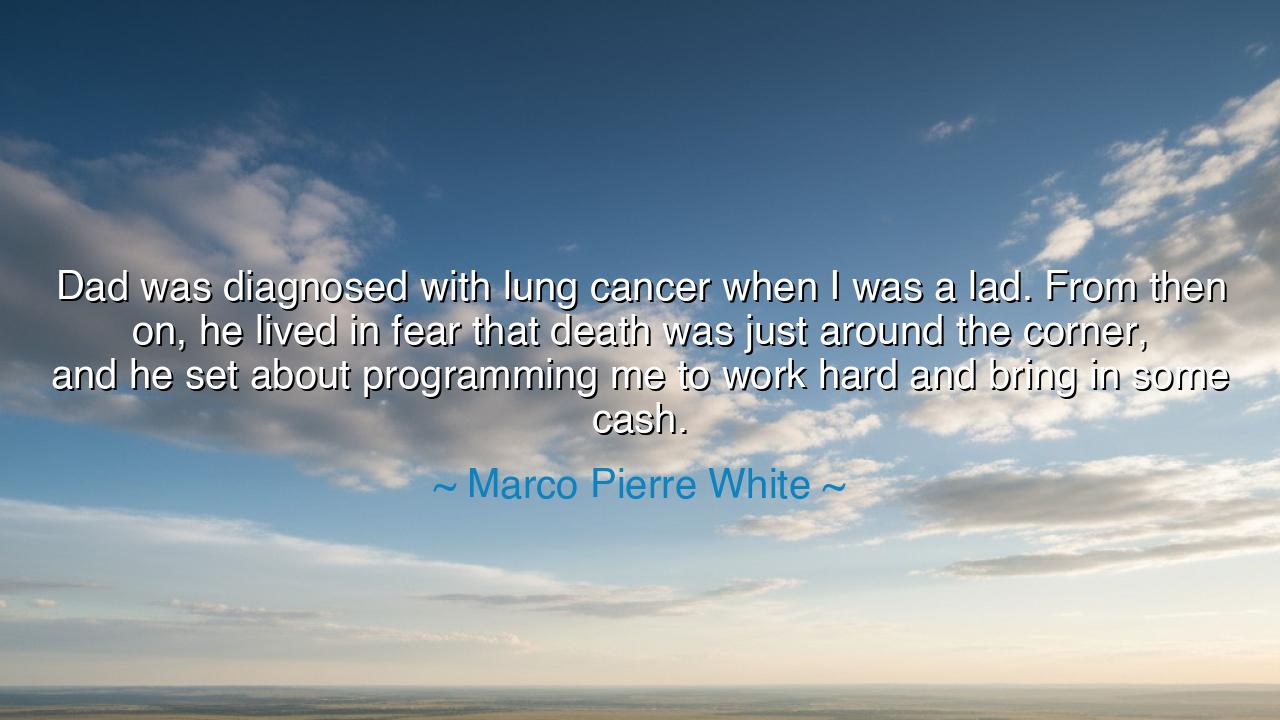
Dad was diagnosed with lung cancer when I was a lad. From then
Dad was diagnosed with lung cancer when I was a lad. From then on, he lived in fear that death was just around the corner, and he set about programming me to work hard and bring in some cash.






"Dad was diagnosed with lung cancer when I was a lad. From then on, he lived in fear that death was just around the corner, and he set about programming me to work hard and bring in some cash." — Marco Pierre White
In these somber and revealing words, Marco Pierre White, the fiery and poetic titan of the culinary world, speaks of a truth as old as mankind—the inheritance of fear, labor, and love between father and son. Beneath the plainness of his words lies a story of tenderness shaped by hardship, of duty born from mortality. His father, faced with the shadow of death, did not waste his remaining years in despair; rather, he turned to his son and sought to prepare him for the struggles that awaited. It was not merely work he taught him, but the necessity of resilience—the ancient instinct of every parent who senses the end drawing near and seeks to leave strength, not sorrow, as an inheritance.
The origin of this quote rests in White’s early life, long before the fame, the Michelin stars, and the storms of the kitchen. His father, a chef himself, carried the burden of illness and the haunting knowledge that his time was short. In that awareness, he looked upon his boy and saw both hope and vulnerability. And so he “programmed” him, as Marco says, not through cold instruction, but through example—through a life that revealed the urgency of work, the value of self-reliance, and the preciousness of every hour. For when a man lives knowing that death is close, every moment becomes sacred, every act of preparation a legacy.
The image of the father “programming” his son evokes the deep and sometimes painful way that fear becomes wisdom when passed from one generation to the next. The father, unable to conquer death, seeks instead to arm his child against the uncertainties of life. It is an ancient ritual: the blacksmith teaching his son to wield the hammer before his own hands grow weak, the farmer passing down the rhythms of the soil, the soldier teaching courage to his child though his own heart trembles. In such moments, love takes the form of instruction, and fear becomes discipline. The child may not yet understand, but in time he will see that the lesson was not of labor alone—it was a lesson in survival.
Consider the story of Spartacus, the gladiator who rose from chains to lead thousands toward freedom. Before he was a rebel, he was a son, taught in his youth the harshness of a world that offered no mercy. His elders, hardened by toil and injustice, prepared him not for ease, but for struggle. Their lessons—born of pain—became his strength. So it was with Marco Pierre White. The father’s fear of death did not crush him—it became the seed of ambition, pushing him to work with relentless energy, to rise from humble beginnings to mastery. Yet, as with all such inheritances, the same fire that forged his success also burned within him—a mix of gratitude and unrest, of love entwined with the echoes of loss.
There is in this quote a tragic beauty: the way mortality sharpens purpose. The father’s fear, instead of leading to paralysis, became a kind of sacred urgency—a drive to ensure that his son would never be helpless, never without means, never unprepared for the coldness of the world. In this, we see the paradox of human love: that sometimes it appears harsh, even burdensome, but beneath it beats the desperate tenderness of one who wishes to protect. The father who insists on work and responsibility is not devoid of affection; he loves too fiercely to leave his child unarmed.
And yet, this inheritance of duty and ambition carries its own weight. For those taught early to survive, rest often feels like guilt, and peace feels foreign. But the wise among us learn that the lesson of our parents is not only to labor, but also to live—to find meaning beyond the struggle. Perhaps this is what Marco Pierre White, looking back, now understands: that behind his father’s fear was love in its most human form—imperfect, urgent, but real. To recognize this is to forgive, and in forgiveness, to find peace.
So, my child of the future, learn from these words: life’s greatest teachers often speak through hardship. When those who love you push you to work, to endure, to strive—it is not cruelty, but care shaped by their own encounters with pain. Accept their lessons, but do not inherit their fears. Work hard, yes, but also remember to savor the time they wished they had more of. For as Marco Pierre White’s story reminds us, strength passed down through love is a sacred gift, but it must be tempered with grace. Let your labor honor their struggle, and let your joy heal their sorrow. In this balance—between ambition and peace—you will find the true meaning of inheritance, and the freedom they longed for you to have.






AAdministratorAdministrator
Welcome, honored guests. Please leave a comment, we will respond soon